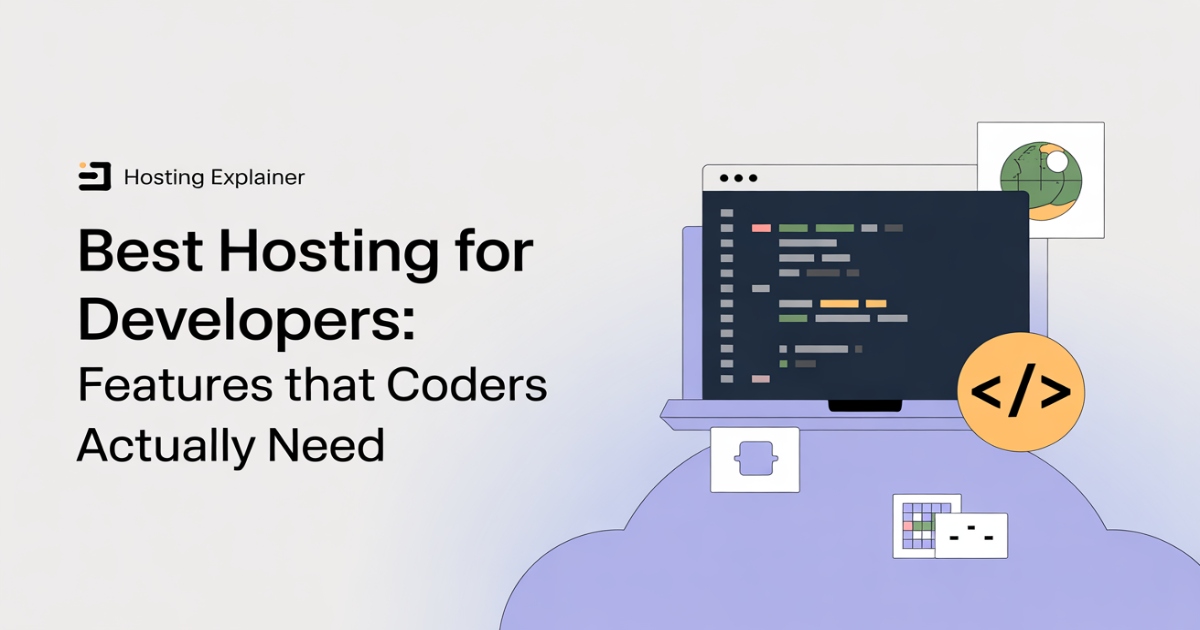Best Hosting for Developers: Features That Coders Actually Need
When I first started building websites, I thought hosting was only about “speed and uptime.” But as a developer, I quickly learned that I needed much more.
A normal hosting plan often feels like working with one hand tied behind your back. You can’t control the server, deploy code easily, or test changes without breaking something.
That’s why this guide is here. I’ll walk you through the best hosting for developers, highlight the features that coders actually need, and share a few lessons I learned along the way. If you’re a programmer looking for developer-friendly web hosting, this article will help you make a smarter choice.
Why Developers Need Specialized Hosting (Not Just Any Plan)
Developers work differently from bloggers or small business owners. We need more than drag-and-drop site builders.
- Control: Access to the server, command line, and databases.
- Flexibility: Support for different languages and frameworks.
- Scalability: Ability to grow as projects expand.
- Automation: Tools to deploy code quickly and safely.
Think about it this way: a regular hosting plan is like renting a furnished apartment where you can’t move the furniture. A developer-friendly host is like owning your own workshop—you decide what goes in, how it works, and when it changes.

Key Features Developers Actually Need in Hosting
1. SSH Access and Command-Line Control
Every serious developer needs SSH access. It lets you log into the server, run commands, and manage files without clunky dashboards. I use it daily to push code and debug issues in seconds.
Without SSH, even simple tasks like updating dependencies or running scripts can become painful. For developers, it’s non-negotiable.
2. Git Integration & Version Control
Version control is a lifesaver. Hosting with Git integration makes it easy to sync projects and roll back changes.
I once worked on a project where a client requested daily updates. With Git, I could push commits, and the hosting server would pull them instantly. No manual file uploads, no downtime, and no mistakes. It saved hours each week.
For team projects, Git integration is even more powerful. Everyone works on branches, merges are smoother, and bugs are easier to trace.
3. Support for Multiple Programming Languages & Frameworks
Developers rarely stick to one stack. You may build a Node.js app today, a Python script tomorrow, and a PHP site next week.
A good developer hosting provider supports all these environments. That way, you don’t need to juggle multiple accounts just to keep projects alive. This flexibility is especially important for freelance developers who never know what stack a client will request.
4. Staging Environments & Sandbox Testing
Pushing code live without testing is risky. A staging environment lets you test updates before they affect real users.
I once deployed an update that crashed checkout on an e-commerce site. Luckily, staging caught the bug before it went public. Without it, the store would have lost sales and trust.
Staging environments also help with experimentation. You can try new frameworks, APIs, or design changes without worrying about breaking the live version.
5. CI/CD & Automation Tools
Speed matters in coding projects. Hosting with CI/CD pipelines lets you push updates automatically. Instead of uploading files one by one, you can set rules: every commit gets deployed, tested, and rolled out.
For example, a personal project I built on GitHub was tied to a host with automated deployment. Every time I committed changes, the server tested them and updated the live app. I didn’t have to log in or touch a file manager; it was all seamless.
Automation reduces human error and frees developers to focus on coding instead of server maintenance.
6. Docker & Container Support
If you use Docker, you know how powerful containers are. They let you package apps with everything they need—dependencies, configs, and libraries—so they run the same anywhere.
Hosting that supports Docker ensures your local environment matches production. No more “it works on my machine” headaches. This is especially useful when working with teams, since everyone can run the same container without setup problems.
7. Database & API Flexibility
Projects need different databases, from MySQL and PostgreSQL to MongoDB. A developer host should also offer API access, so you can connect and extend features easily.
For example, I once built a small analytics app that pulled data from several APIs and stored it in PostgreSQL. Without flexible hosting that supported both, I’d have needed third-party services.
The ability to experiment with APIs and databases keeps developers creative.
8. Scalability & Performance for Coding Projects
A developer project often starts small, then grows fast. A good host should let you scale resources without moving to a new provider.
Imagine building a side project that suddenly goes viral on Reddit. Without scalable hosting, your server will crash, and users will bounce. With cloud or VPS hosting, you can quickly upgrade resources and keep the project alive.
Performance matters, too. Slow servers kill user experience and frustrate developers during testing. Look for SSD storage, modern processors, and strong bandwidth.
9. Security & Backup Solutions for Developers
Every coder makes mistakes. A bad deployment can break the site. That’s why automatic backups and security features are vital.
The best developer hosts offer daily or even hourly backups, SSL certificates, DDoS protection, and firewalls. Some even allow you to restore individual files instead of rolling back the whole site.
Security isn’t just about keeping hackers away—it’s about protecting your own work and reputation.
Best Hosting Types for Developers
1. VPS Hosting for Developers
A Virtual Private Server (VPS) gives more control than shared hosting. You get root access, flexible resources, and custom configurations. It’s a good balance between power and price.
2. Cloud Hosting for Developers
Cloud hosting is all about flexibility. You pay for what you use, and scaling is instant. For growing projects or apps with unpredictable traffic, it’s often the smartest choice.
3. Managed Hosting for Coders
If you want to code without managing servers, managed hosting works well. The provider handles updates, patches, and security. You trade control for convenience.
4. Dedicated Servers for Advanced Developers
For full control, nothing beats a dedicated server. You get the entire machine to yourself. This is best for enterprise projects or apps with heavy traffic.
Best Hosting Providers for Developers in 2025
Here’s a quick look at popular options and the developer features they offer. This comparison makes it easier to see which provider matches your workflow and budget:
| Provider | SSH | Git | Staging | CI/CD | Docker |
|---|---|---|---|---|---|
| DigitalOcean | Yes | Yes | Yes | Yes | Yes |
| AWS | Yes | Yes | Yes | Yes | Yes |
| Linode | Yes | Yes | Limited | Yes | Yes |
| Heroku | Yes | Yes | Yes | Yes | Yes |
| Hostinger VPS | Yes | Yes | Limited | _________ | _________ |
Each host has strengths. Some are powerful but pricey, while others are simple and affordable. The best choice depends on your project’s scale, your coding stack, and how much control you want.
These aren’t the only options, but they’re some of the most reliable. What matters is how each aligns with your workflow.
My Personal Experience Choosing Developer Hosting
When I first started freelancing, I used shared hosting. It was cheap but frustrating. No SSH, no staging, and slow support.
After switching to a VPS with Git integration, my workflow improved overnight. I could finally deploy updates in minutes instead of hours. Clients noticed the difference too, projects were delivered faster and with fewer bugs.
My biggest lesson? Don’t choose hosting only on price. Think about the tools you’ll need six months or a year from now.
How to Choose the Right Hosting as a Developer
Here’s a quick checklist (and yes, this could double as a HowTo schema):
- Check for SSH and Git support.
- Make sure your languages and frameworks are supported.
- Look for staging environments and CI/CD tools.
- Decide if you need VPS, cloud, or managed hosting.
- Review scalability, pricing, and backup options.
- Test customer support. It matters when things break.
- Choose a host that fits both your current and future needs.
FAQs About Developer-Friendly Hosting
- Do developers really need special hosting? Yes. Standard hosting often lacks SSH, Git, or staging. These tools are essential for developers.
- Which hosting is best for developers in 2025? It depends. Cloud hosting is best for scalability, while VPS hosting offers balance. For ease, go with managed hosting.
- Can I host multiple coding projects on one server? Yes, if your host allows it. VPS and cloud plans usually support multiple apps.
- Is VPS or cloud hosting better for developers? Cloud hosting is more flexible, but VPS gives strong control at a lower price.
- What’s the cheapest developer-friendly hosting plan? VPS plans from providers like Hostinger or Linode are budget-friendly and include SSH.
- How do I know if a host supports my programming language? Check the hosting documentation or ask support. Always confirm before you buy.
Why Developer-Friendly Hosting Matters
The best hosting for developers is more than uptime and price. You need SSH, Git, staging, CI/CD, and flexible support for coding projects. Without these, your workflow slows down and your projects suffer.
If you’re serious about development, invest in developer-friendly web hosting that supports your tools today and grows with you tomorrow.
It’s not just about running apps; it’s about saving time, reducing errors, and giving you the freedom to build without limits. Choosing wisely now means smoother launches and fewer headaches later.






